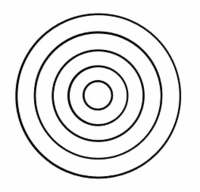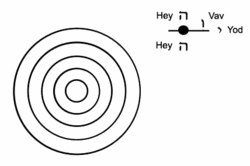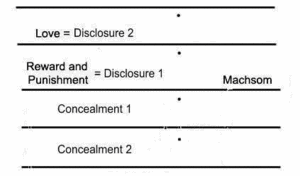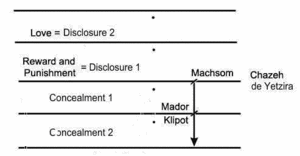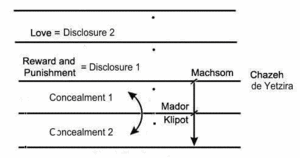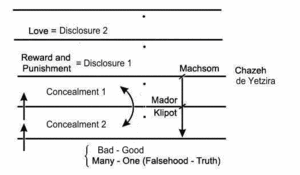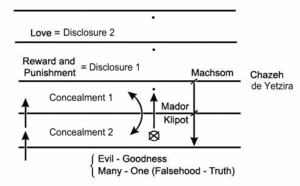Article "Thou Hast Hemmed Me In Behind and Before" - Talk 2
-
Bold and in quotes: Original text of Baal HaSulam
-
Regular: Commentaries of Rav Laitman
-
lowercase italics: emphasized words
-
Capitalized italics: transliteration from Hebrew
We are continuing to study the article Thou Hast Hemmed Me In Behind and Before, by Baal HaSulam from the book Pri Hacham, Articles, page 102, from the paragraph: “The world and concealment.”
This is the meaning of thou hast made them all in wisdom, the land is full of thy possessions. Everything is kept in the 32 paths of wisdom. Because of that, the earth is filled with your possessions and there is no place vacant from thee, for all goes to its root.
It means that the Upper Providence, from the perspective of the Emanator, surrounds everything. We can picture all of creation as a kind of ruling, big, eternal force that is in everything. Within it, this force created all kinds of zones and places where it hides. By that it gives the creature the ability to exist, because the creature is something that’s outside the Creator. What does outside the Creator mean? It has some independence.
We’re not talking about matter, such as a pen. No such thing really exists. It just appears in our senses as the still, the vegetative, the animate, and the speaking, according to colors and sizes. With respect to the real senses, our material, this imaginary substance, is not sensed at all. But what is felt, is whether something exists or doesn’t exist in relation to the Upper Force, to the extent of which the Upper Force is hidden. This means that the creature exists to the extent that the Creator is concealed. If the Creator appeared, then the creature would not be in existence.
Accordingly, we study the whole section that talks about the beginning of creation. We study about existence from absence, a point of darkness, a black point that appeared on top of the Upper Light that fills everything. In that point the Creator restricted Himself, He hid Himself, and the posterior of the Light is the darkness that appeared. Then He continued to hide Himself more and more. By that this point develops until desire, understanding and attainment is created in it. Of what? It is made either of its essence or of the Creator's essence, from the perspective of His concealment.
Initially the creature exists as the backside, in concealment of the Creator. That’s how creation comes to us from the Creator. That's why the creation is called outside the degree, outside of the Creator, where He is hidden. But afterwards, it allows the same creature not to be at the expense of concealment from the Creator. It allows it to exist by acquiring the attribute of the Creator from the Creator and by filling the concealment of the Creator with feeling Him. Then in that same part where the Creator hid Himself, the creature fills it with the Light, with the attributes of the Creator and that part is counted for the creature. That’s why it’s said that the creature is then erected for eternity.
But now during concealment, this is why it is called “the world” from the word He'elem (Concealment). And the concealed Light that clothes the world is called a point - Behinat Yod and it’s divided into two Heys – the Hidden World and the revealed World.
With respect to that point, we always have two discernments: a revealed part and a concealed part. They are called the concealed world and the revealed world. That’s why this point is divided into two Heys. Therefore it's called a Yod: the ten parts that come from recognizing the hidden part and the revealed part together.
From both of these parts we have reality, a being, the feeling of the creature's existence. If only one part would be revealed (it doesn’t matter which one), the creature would not exist because the creature exists in the discernment between itself and the Creator. It exists in the boundary between these two Heys. It absorbs them within itself and builds its awareness on top of them, and this awareness is the essence of its existence. Therefore the creature can’t exist without the revelation and the concealment existing together within the creature: the concealed world and the revealed world.
Man’s work is to discover this point and extend it in the form of Vav from one world to another.
That is to say (man's work is) in the connection between worlds, the Upper one and the lower one, making this connection according to one’s own choice, (using) the Masach and the Returning Light means, that is, wanting to make the two Heys equal with respect to him so they don’t divide him, but instead they connect together.
Meaning Vav between the two Heys, to disclose to all the abundance of Light that extends from the Surrounded Light to the Surrounded. Meaning the two Heys in the form of Bina, Yesod, Malchut.
We have the attributes of Bina and Malchut, but the Yesod is where the creature equalizes its form with the Creator. On the one hand, of course it remains in concealment and doesn’t want the disclosure, but it makes disclosure on top of its substance. It's called taking example from the Upper One and operating this way according to the example. By that it maintains itself, what it is and fills up the space or connects both of them together.
Subordination, Differentiation and Sweetening
The desired way for man is through three discernments: Subordination, Differentiation and Sweetening. Meaning, the Lights of Marat Haser Ktiv, (without the letters Vav) because the Light of this world was created from darkness.
He writes “As far as Light exceleth darkness.” When we attain our existence in darkness, that is, see that we lack something and this lack is not for our desire, but for the Light, for bestowal, for something that is not in our nature; when we see the lack of bestowal from within the darkness, “as far as Light exceleth darkness,” that is, when we begin to discern our desire and its possessions as darkness, then only from what is more than that there will be Light to us. It’s called “as exceleth,” an addition.
What can this be based on? Once a person relinquishes his will to receive with all the possible positions that it might have, and it becomes darkness to that person, then correspondingly one begins to discover the Light in the attributes of bestowal. That’s the meaning of “As far as Light exceleth darkness of the creature.”
Of what help is a candle during the day? During the day its Light does not ascend. That’s the meaning of the husk comes before the fruit.
What does all that mean? That only from darkness, when the darkness is the will to receive with all its possible fulfillments, only from that darkness can one attain that whatever comes from above from the will to receive with its fulfillments, that's considered Light. And then one begins to rise toward it.
This is why he becomes a partner to the Creator in the act of creation; he elicits the Light from the darkness.
Just like the Creator created the black point opposite the white Light, so does the creature act only from within his own nature. The creature discovers that his nature is a black point and he goes toward the white Light. That’s what is meant by “elicits Light from darkness.”
But again, this darkness is all of our will to receive, from all its possible possessions. We have to see all of them as only one black point, we have to come to that discernment. Then, one really comes to live the sentence: “as far as Light exceleth darkness,” because there is nothing that is darker than that black point. It doesn’t change. But with respect to a person it seems huge, that it takes up all of reality and that everything is the will to receive; it seems endless and enormous. Actually the will to receive remains as it was created. It remains only as a black point from which we can discern the excellence of the Light.
Meaning, when one looks at oneself, how dark and despicable he is before the sublime sanctity and how he is wearing rags and in that the Light is surrounded.
By comparing that point and everything that appears in it with the Light, then he discovers that the Light surrounds him from all sides. What does “surrounds him from all sides” mean? In no discernment in the will to receive is there any advantage; it’s all darkness. In the end, each and every discernment and desire and possession in all of their forms, it’s all darkness, and in terms of the volume that they all take, and the appreciation they all get, they are only a black point. If it is restricted to that point, then by that he discovers that he is surrounded by the Light from all sides.
Paying attention to the Creator's question to fear the honorable and terrible Lord, he strengthens with great force to subordinate the evil within him— the bad servant and the bad maid and to surrender to the mistress who is with him, within his uncleanness.
In the beginning, of course he judges the Creator from within the point, from within his desires where everything seems opposite to him. He disagrees, and wants to dominate; he condemns the Providence to the extent that he discovers it. But gradually, through effort, through subordination that comes from the work, he nonetheless begins to understand who is the master and who is the slave, who is the mistress and who is the maid. He swaps them in his evaluation, so that what happens is, ”I shall see an opposite world.” He begins to judge not from the perspective of the darkness, the will to receive, which becomes as darkness to him because previously it was filled with possessions, but he begins to judge everything from the perspective of the Light.
Until he feels in his soul, that the awakening to externality is canceled and revoked and has surrendered in him. And then he comes to the differentiation, he is able to differentiate between Light and darkness.
It means that a person needs to work, to put in effort until he reaches the state where in all externality that appears or can appear to him, in all pleasures, he will not feel any delight that would serve him as such. Everything he uses will be as a necessity for existence and then whatever he does will be neither condemned nor praised. It will not be considered as being in it, as using it, as receiving anything. Then out of that point, when he doesn’t feel that he works to get any possessions in this world, out of that point he will come to the next phase.
That does not happen as a result of oppression, God forbid, or some external persuasion, by restraining oneself as in diets, limitations or monasticism; it doesn’t come from that. It’s only through individual work with books and within a group, using everything that the Kabbalists have given us as councils, the 613 councils that we work with. “Whatsoever thy hand attaineth to do by thy strength, that do” in order to discover the essence of the will to receive, so that it will appear to you in its true form: as black and as only a point.
When that state comes, one begins to work differently. That is, all the states that we have to go through come to us from Above, but of course first we must exert effort from below. However (we have to do it) in a way called “I labored and found.” Meaning, I can never attain anything I want to attain by force. “I labored and found” means that I make an effort through one thing and get another thing. Why? Because then I don’t suppress myself, my desire.
I want my desire to be for something special. Say I want to love Coca Cola, but I don’t like Coca Cola. It doesn’t come to me directly, to aim myself at Coca Cola all the time. In fact I do it through all kinds of other forms where I draw from Above a special act that will create a desire for Coca Cola in me.
That’s how it is in spirituality. We cannot work directly on bestowal because it’s not Coca Cola; it's bestowal. It’s something supernatural. Therefore when I work on my desires directly and suppress them, I can never become holy, separated from lusts. On the contrary, it is said that one who breaks, gets two instead of one. Rather, there is a place for work and in return, in a different place, you get the reward. There is no connection between one and the other. This is why in everything in spiritual possessions, it is: “I labored and found.”
Question: Regarding necessity, is it a state you come to before the Machsom (barrier) or after it?
It’s before the barrier. One begins to feel this before the barrier with respect to himself. It’s not permanently, as he did not go through the correction yet. If he was corrected permanently with respect to spirituality, then he’d be either in Ibur or Yenika. But with respect to things in this world, with respect to himself, his goals, no matter how they may seem on the outside, but from within he goes into a state where, as Baal HaSulam writes, this world is condensed into a black point.
It means that then you can get whatever you want, however now your only intention is to use things for a purpose. So you might be eating ten meals a day, a king’s feasts, but in essence, it’s what you do with it and why you do it.
I remember I was very surprised when I first came to Rabash. He said, “Go buy me some yellow cheese, buy me the best.” “What do you mean the best? Give me some flavor or something, something you like.” He said, “The best.” “The best, what kind of a Kabbalist is this?” These things seem very strange.
Then he is awarded with differentiation to differentiate between Light and darkness. And will not substitute bad for good and good for bad and if he will substitute, meaning the awakening of the inclination that is necessary to him, it will be sanctified and dedicated to the Creator alone and that’s the sweetening, the craving for the Creator. The meaning of true love, is that it comes after he separates between the good and the bad, between the greatness of the Creator and his own lowness and baseness. He will keep within himself “thou shall remove the evil from within thee,” because he will be ashamed doing it, and then he’ll sweeten the remainders of his inclination that cannot be eradicated. And elevate them to their true roots.
We learned more than once that our ascents are in double concealment and single concealment, and then the crossing of the Machsom (barrier) to disclosure, which is called reward and punishment—the first disclosure. And then comes the double disclosure, which is called love.
In double concealment there is some sort of subordination, in single concealment, differentiation. Then one crosses towards the Tikkun (correction) itself in first disclosure, and then towards the giving of the Light in double disclosure.
It all comes gradually. Every subsequent degree is established upon the former one. It does not erase the former degree but builds itself as an addition to the former one. I think it’s pretty obvious. All of these verses are only additions to what we learned.
Question: What’s the difference between the unawareness of a person before he crosses the Machsom and the double and single concealments?
I don’t know what you mean by Adam (a person). The wisdom of Kabbalah talks about a desire. Now if you built a Golem (robot) that has flesh and bones and organs, will you call that a person? We don’t call that a person. For us, a person is a certain discernment in a creature, which in this world we call Adam (a person).
Say, a man. You look at him. Is he a man or a beast? If he lives by instincts and by what he was given, by what was put in him as a child, a youth, his education and the influences of society; if he follows this, absorbing its values and keeping them unconsciously, then he just does it. With the exception of very few everyone does that in our world. With respect to the definition in the wisdom of Kabbalah, these are not considered people. They perform the same function in our world as animals. They follow orders but they do so unconsciously.
We have plenty of such (creatures), both those who look like people and those who walk on four legs—animals and beasts or plants, the inanimate. Man is one who does not take orders from nature but begins to see how he receives, how he is dependant upon nature, how it operates upon him without asking for his opinion. Then his awareness begins to develop within him. He can’t do anything yet but he can already see based on himself that nature is in control.
Over the years we begin to see that we are not the owners of our lives, that life goes by and you didn’t do a thing, it all just kind of happened to you. Will you be able to do something in the future? You begin to see based on experience that in the future too, who knows, you probably won’t be able to do anything either. That’s the beginning of the awareness.
Afterwards, you begin to search, is this nature? Is this life? Is this the world? As a result of this search, a chance appears to not only know that we are zilch, but that we have more than the ability to criticize nature. That too already is a serious degree, to see how nature influences me, how I am operated by it, to look at myself from the side like a researcher, where I don’t have a choice of what I have to do, yet I still see how it operates on me.
The next degree is questioning if I can participate in it using my other, exterior mind, not simply as a researcher, but as someone who wants to interfere, to change my function. Meaning I want to transcend from the degree of necessary existence to the degree of voluntary existence. How? Can I change nature? I can see and understand what does it mean that I participate in it? Will I change the laws by which nature operates on me and by which I react? They say no, this is where it ends; you can’t. But you can see these laws more internally and understand that these laws are ideal, absolute laws.
Only you will understand them and you’ll begin to agree with them not out of looking at them from the side and observing them. Rather, you will begin to get to know them and want them to exist specifically in this way. In other words, for all the actions that you see, you precede your desire, your decision, your awareness, as if you are planning these actions and then they happen.
This is called working with intention. And truly, there is nothing to do in the actions themselves. Afterwards, you discover that even the actions don’t exist, that all of these actions come to show you, to help you build the right attitude. Everything is in complete rest; there are no actions at all.
To the extent that you acquire the right attitude, the mind ( Rosh), the calculation of the right intentions that it will happen the way it does, you see that nothing does need to happen. You’ve corrected your attitude and that’s it. All of the changes that you saw were only to give you discernment between the previous attitude and the correct attitude. But in actions nothing was done. This is actually what is called the act itself: the change in your attitude. You elevate yourself by so doing, from the natural researcher level, to the level of researching your consciousness, your intentions. By that, you build your Rosh (head, mind), which is what was the missing in the whole of reality.
Question: There is something that I still don’t understand.
I envy you.
Question (cont’d): Not just one aspect, many things. You often say that the Machsom is at Chazeh de Yetzira and sometimes you say that it’s at the Sium. Where is it?
What do you care? If we are talking about attainment, then the Machsom is at Malchut de Malchut de Assiya. Open the Introduction to the Book of Zohar, by Baal HaSulam and he begins to explain in there how much effort you have to make in order to attain Malchut de Malchut de Assiya with Nefesh de Nefesh de Assiya and then Ruach de Nefesh de Assiya, so that you’ll still have generally only the Light of Nefesh. Until you attain NRNHY de Nefesh de Nefesh, meaning NRNHY de Malchut de Assiya and then Nefesh de Yesod de Assiya, etc.
In this sense, out of attainment we come from this world to Malchut de Assiya. Then from the perspective of our broken Kelim and from where they are with respect to the disclosure and concealment, we are at Chazeh de Yetzira, the place where the Raglaim of the Adam ha Rishon ended when he was born.
The place of Parsa de BYA and the place where the Shabbat ZON ends, etc., is the place where all the vessels of bestowal in the worlds BYA end. We’ll talk about it; it’s the place where from that place down, the shell section begins ( Mador ha Klipot).
Mador ha Klipot (shell section), in it too there is a division, as usual, seemingly to Galgalta ve Eynaim and AHP. In that too you have double concealment and single concealment. When and with respect to what is the double concealment and single concealment? Maybe they should swap so that instead of double concealment there will be single concealment and vice versa?
When a person begins, he thinks “alright, concealment.” He doesn’t know what is concealed or why.” Later he begins to see concealment: either it is concealment that He is Good and Benevolent or concealment that there is or isn't Someone Who does good or bad. The single concealment is that instead of good, I see and feel bad, and the double concealment is that instead of one single “there is none else beside Him,” I see many forces in what appears to me. You might say (that it's) good and bad, and true and false.
Does this appear to a person immediately as he begins his work? Or maybe later on, when he learns for a year and then he begins to see what his discernments are? It doesn’t come directly.
Is it double concealment or single concealment? Relative to what do we define? Double concealment means seeing both good and bad, and true and false, or multiple authorities. It’s double concealment, it’s twice. He feels it immediately? No, well perhaps it’s like this as he advances. In the beginning, he has nothing, only darkness, bad; he feels absence, having nothing (see Drawing No. 7).
In spirituality you always have a problem: it depends on which perspective we are looking from. You can look either from the perspective of the Kelim or from the perspective of the Lights. Correspondingly, we always have confusions in our definitions, but later on that disappears.
Question: At the end of the paragraph we read that Baal HaSulam writes about the difference between good and bad, “and he observes thou shalt remove evil from among thee because he shalt be ashamed.” This shame that a person feels after he reaches attainment, can he cultivate it along the way?
We can’t cultivate anything on our own, as I have said, “I labored and found.” We have to follow the tips of the Kabbalists because we are in darkness. I don’t know the steps that I actually take, but if something appears, so it appears. And I didn’t know about it before, I didn’t understand it or feel it previously. I didn’t have this or that attitude towards this, towards these things, but suddenly I have a certain attitude, suddenly this and that discernment become important to me.
Take for example my dependence on others, my dependence on the Upper Force. Previously I didn’t discover it, now I see that I’m in a system of forces. As much as I try to give to my environment, to connect to friends who are equal to me in the goal and the way, accordingly, I begin to receive something and to do some things.
It means that we cannot determine in advance any actions that have to happen to us. Similarly to how a child in our world cannot ask to be three years old when he is two years old. He doesn’t know what being three years old means, he simply wants to be a grown up and do whatever he can. He runs, he wants to do this and that, you bring him games and exercises, and by that he becomes smarter.
Does he prepare himself to be smarter, to be older? No. That’s exactly how we are, it’s a replica. If you still haven't discovered what being three means when you are already at the level of three years old, then how can you ask to have that if for the time being you are only two?
“Remember and keep” Were Said in One Sentence
“Remember and keep” were said in one sentence, what the mouth cannot say and the ear cannot hear and the heart cannot think and contemplate…
There are two discernments here: remember and keep. We don’t know exactly what each of them is, but there is something special there because “they were said in one sentence.” What is a sentence? I don’t know. What is one? I also don’t know. But when it comes to the will to receive in us, we cannot tolerate such a thing. That’s what Baal HaSulam writes.
We have to understand why it was said this way and how it relates to us. It is written “the Lord saves men and beasts,” and our sages said, “these people that are cunning and pretend to be like beasts;” meaning the path of creation that the Creator created is two opposites in the same carrier.
That’s the problem, that’s why it’s difficult for us to find our way in the wisdom of Kabbalah. Because we always get two opposites, which are actually connected in creation itself, they add to one another. They compliment one another. But we who are outside of the correction and who can connect them together don’t understand how it happens.
How can it be that “if I’m not for me who is for me” that is, everything is up to me, and “there is no one else beside Him,” that everything is up to the Creator? That’s the root of all the rest of the problems, divisions, inequalities and disconnect between all the discernments. If the Creator does everything, where is the creature? If the creature does it, meaning if it has independence and it exists, what about the Creator?
The problem is like the question “can the Creator build a stone too heavy for Him to lift?” People ask these stupid questions, but why do they ask them? Because people don’t understand that they are in a state where two opposite things cannot join together. If the two opposites do join together, it's not called a connection because they only neutralize each other. They can’t be both opposite and together.
That is why we don’t understand spirituality and that is why spirituality is hidden. What does it mean that it’s hidden? I don’t perceive it. Nothing is actually hidden, but my present senses cannot connect the two together and that’s why I don’t see it, for spirituality is only the connection between the will to receive and the will to bestow, together. If I don’t have that connection in my senses, I don’t feel this phenomenon. That’s the meaning of concealment.
To the extent that I prepare to make these things within me connected, without neutralizing but instead by sustaining and complimenting each other, I’ll correspondingly have the preparation in my senses, I’ll immediately feel the revelation. It’s called ascending in the degrees of worlds. The concealment is removed. And then I’ll see that I’m in a state where there is Ein Sof (Infinity) around me. What is the Ein Sof? All the attributes of reception and the attributes of bestowal come together and compliment one another.
It all depends on our preparation. To that extent we have concealment or revelation, both in the mind and in the heart. That’s the only thing that we have to work on. Before that we have questions. “Do I do something? Does the Creator do it?” “If I’m not for me, who is for me?”, before that or after that? “Israel the Torah the Creator,” this way or that way? We always have questions. We always have a lack of understanding and that breaks a person, and here there is nothing you can do.
That is why in regard to the acquisition of this ability to connect the two opposites together, we were told that we have no choice, one has to go with faith above reason. What’s faith above reason? It’s the third patent, the third force that can connect these two things together. That’s what you need to acquire. What is this third force-faith above reason? It is the intention to bestowal.
But until then, of course, we’ll always have questions. The answer is in the preparation of the Kli for receiving the revelation. The receiving of the revelation within the Kli according to the congruence between them is called Tshuva (repentance). Repentance in what? Tashuv Hey Legabei Vav (the Hey returns with respect to the Vav) according to the equivalence.
Again, the whole path of creation that the Creator created is two opposites in the same carrier. And in this form all the connections in the world were imprinted and this is the whole of the act of creation.
Question: So the preparation of the opposites is actually the Kli?
No, we don’t need to prepare the opposites; they are in us. They are very well prepared after the breaking of the vessels; everything is in opposition to the Creator. We have the needed preparation thank God. Why am I saying “thank God?” It is because one has to bless for the bad just as for the good. One needs to understand that it’s all deliberately prepared for us. We need to equalize these things. That appear to us in life at every single moment. Someone says, “I’m suffering, why am I not succeeding, I’m in pain, I’m depressed,” whatever. All of that stems from misunderstanding the ability to connect these two things together.
Baal HaSulam writes that our lack of understanding of Providence is the reason for all the bad and our understanding of the Providence is the reason for all of the good. If you simply understand how it works within these two opposites, you’ll be happy; because you don’t have to change anything except this perspective. This perception gives you happiness.
People want to change that by force to try and feel good in their present Kelim, but they don’t understand that the recognition of evil comes as two opposites one opposite the other, that the attributes of the Creator and the creature are in collision. So if I erase one of them, it’s not going to help. That is essentially what is being revealed now in our life time. That’s why the method of connecting these two things together, the method of Kabbalah, is the only thing that can bring happiness.
Everything is scrutinized in the thought. It’s all about understanding how Providence works. That's the only way.
Question: But first you have to be within these two opposites before you can understand.
No, we cannot be within these opposite. Actually our consciousness occurs by discovering the situation between them. I don’t know what good is or what bad is, what Light is or what darkness is. I can only attain the contrast, the difference between them. It is only in-between them. My sensation is only when pleasure and pain are about to come together. That’s where I feel the flavor. But without the other, it is unfelt in me. My senses perceive pressures, differences, like a dial. That’s what we always say about spirituality, that spirituality is not information itself, but the changes in it; the coefficient.
Question: Should the person be in those opposites?
The person should be within these opposites, on the boundary between them. That’s where we have the sensation, the existence, everything. If you could neutralize one of the opposites, you’d fall into unconsciousness in mind and heart, completely; everything would disappear.
What happens now? Now we are in the world of Ein Sof. I’m in it, so why don’t I feel it? The opposite state between myself and the world of Ein Sof, is not revealed to me. When the opposite state begins to appear, I have the recognition of evil. Then I go into concealment, and that begins my process of correction, the degrees of single and double concealment that we speak about.
Question: Did they come to Mount Sinai into a state of Arvut because they found this balance?
At Mt.Sinai there was the disclosure of the lack in the attributes of the creature with respect to the attributes of the Creator to the greatest extent. It’s when they saw that they couldn’t bond into the system of Adam ha Rishon as it was commanded from Above. Then they came to the condition of a cry that they can’t, and correspondingly they get the strength to connect as one man with one heart. It’s not that they themselves attained this force, but they receive it from Above. Then, in this Kli, as one man with one heart, all the opposites come together. This is when everyone has an ego that wants to eat the other, but instead they connect though love for each other, using this ego.
You can understand what kind of power and discernments are in each of these opposites within the Kli. When each and everyone feels his own ego, how he exploits everyone but at the same time feels how through exploiting himself with respect to others, he connects them to himself and gives to them.
When the oppositeness between these two states appears, then the oppositeness itself is the new Kli of a person. It's not the Light or the darkness, not the will to receive or the will to bestowal, but rather the oppositeness between them, what he has attained. This is the new Kli that arrives from the sacrifice of man and in it is the reception of Torah. That’s where the Light appears, not the Light that was in creation, but a different Light called “the Thought of Creator.” The Thought of Creation appears with respect to a person. It is the awareness of Godliness, His plan, His program and man’s understanding and feeling of Him. That's what we attain, not nature but above the existing nature. A person identifies, and equalizes himself with the Creator.
